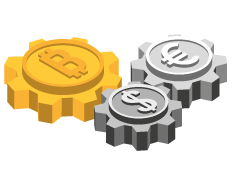
If you’re like most people, you’ve probably heard something about cryptocurrency in the past several months. Despite the hype around this idea, though, it’s tough to know where to start if you’re interested in investing. Most people know that you have to begin with a wallet, but even that can be complex. After all, there are lots of types of wallets, and sorting out exactly what’s available can be difficult. One of the terms you may come across is an HD wallet. Under that one term, though, there are lots of others like “Electrum master private key” and “Bitcoin master public key.” Understanding exactly how these wallets work is essential to clearing up your vocabulary list of terms, and honestly, getting this one is pretty important if you’re going to begin investing.
What is a Wallet?

A wallet is just a place to store your cryptocurrency. A wallet has two features – a public address that you give out so others can send you funds and a private key that has access to so you can spend those funds. It’s this combination of the two different addresses that give you some safety. Wallet technology has been around for some time, but it’s a little problematic because every time you use your currency, you have to randomly generate those public and private addresses so you can access it. If you plan to use cryptocurrency on a regular basis, that gets a bit problematic over time.
Enter the HD Wallet

The HD wallet changes that. HD, in this case, stands for hierarchical deterministic, so a deterministic wallet is something a bit more modern in the world of cryptocurrency. It gets those addresses from one single address – called a seed key or the cryptocurrency master key. They all use some variation of the cryptocurrency master key. Any number of variations can be made from that master private key, Bitcoin or any other currency, so you don’t have to continually wait for secure key generation. More than that, though, you get support for multiple accounts with various cryptocurrencies, and every one comes with plenty of unique addresses so you can continue to complete transactions quickly.
How They Actually Work

If you’ve already used a cryptocurrency wallet, you know you need a public and private address. The public one allows other people to send you funds. The private one lets you spend that. The number of combinations of those public and private keys grows really complex, though, as you start doing more with your cryptocurrency, so you may notice some real issues with both storage and backup every time you do business in that cryptocurrency. Eventually, things could get unmanageable because every pair of addresses you create has to be backed up. Cryptocurrency and Bitcoin deterministic wallets, though, don’t work that way. Instead, using an SHA-256 hash algorithm, you get lots of addresses from a single one (and completely without errors). Visualise it like a family tree. One seed at the top produces many more below. As a user, you just backup your account. This is where terms like “Electrum master private key” and “Master private key Bitcoin” come into play. Each company, like Electrum, offers users a master private key, and that’s your seed key. From that one key, everything else is generated. Each currency, like Bitcoin, offers the same. For your cryptocurrency, often bitcoin, the master public key is all you need to access your funds.
The Advantages of an HD Wallet

There are many reasons you might want to use an HD wallet instead of a traditional wallet. One of the biggest is that you don’t have to wait to create new addresses on a regular basis. That can become an issue for many, but once you switch to an HD wallet, it won’t be a problem anymore. You have one Bitcoin master public key to give out (or one for the cryptocurrency of your choice), then you’re done. You also don’t have to wait for your secure key to be generated because you already have a master private key. Bitcoin and every other cryptocurrency can use this type of wallet. Additionally, you won’t experience the problem so many do with backups. Cryptocurrency and Bitcoin deterministic wallet options need one backup. Just one. You can fully restore your data at any point in the future from that single backup because all of the private keys you’ve generated can be traced back to that cryptocurrency master key. More than that, the key is really easy to remember, which means you won’t lose your funds as so many have. One other reason so many are turning to the HD wallet, though, is that they’re more anonymous. There are so many public and private keys available, so you can generate an infinite number of receiving addresses. That means it’s far less likely that someone will uncover information about who you are, what your balance is, or what your buying habits are.
Types of Cryptocurrency and Bitcoin Deterministic Wallets
There are many different kinds of cryptocurrency and Ethereum deterministic wallet, just as there are traditional cryptocurrency wallets. You can get them as hardware, but you can also get them as a mobile option. There are even desktop wallets. Some are offered free of charge, but others require a paid plan. There are lots of players in this industry including Electrum, Trezor, Mycellium, and even KeepKey. Most have the same features in common. For example, using Electrum means access to a single Electrum master private key just like Mycellium does. All of them offer a Bitcoin master public key to help get your privacy, or one for the currency of your choice, and most offer many of the same benefits. Many more players are joining the game, and cryptocurrency and Ethereum deterministic wallets are more popular than ever.
Do They Work for All Cryptocurrencies?

A determinist wallet is typically talked about when you’re thinking about Bitcoin, but they work for a lot of different cryptocurrencies, including Ethereum, Litecoin, and Cardono. There are even some cryptocurrency and Ethereum deterministic wallet that allow you to store multiple cryptocurrencies in a single space.
Is an HD Wallet Right for You?
If you value your privacy and you’re making fairly frequent transactions, a deterministic wallet really is the way to go. It’s really safe and easy, but it’s not right for everyone, so do your research before you make a decision.